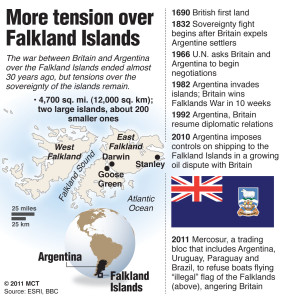Tensions Rise Over Spectacularly Meaningless Islands
The Falkland Islands or, if you ask Argentinians, Las Islas Malvinas, have long been a bone of contention between Argentina and the United Kingdom. Although their destiny was considered sealed by the UK’s emphatic defeat of Argentina in the Falklands War of 1982, tensions over the islands are on the rise once again.
Objectively, the Falklands matter little; their population is estimated at 3,000. Their economy is made up of fishing, tourism, and sheep herding and manages a, to the economies of Argentina and the UK, negligible $125 million in exports. Although there may be some exploitable oil reserves in the surrounding waters, there seem to be no logical justifications for war or even significant tensions over the Falklands.

That being said, emotions over the Falklands run deep. Although the British know that their imperial days are over, they view losing the Falklands Islands as adding insult to injury, and are determined to avoid it. Furthermore, due to the British expulsion of all Argentine settlers from the islands over 150 years ago, roughly 70% of their population is of English descent. The UK takes great pleasure in noting that the people of the Falklands have historically favored British to Argentine rule.
The insult that the Falklands (Malvinas) pose to Argentina is fairly obvious. Argentines were the first settlers of the islands, which lie firmly within its sphere of influence and are considered part of the nation’s historical patrimony. That said, widespread Argentine patriotic sentiment concerning the return of the islands is a recent phenomenon, fabricated and nurtured by the Military Junta that ruled Argentina between 1976 and 1983.
Although the humiliating military defeat suffered by Argentina in the war lead to the overthrow of the Military Junta, it also solidified the Argentine people’s desire to see the islands returned. The defeat called into question the most powerful theme in Argentine nationalism: a belief that Argentina is both fundamentally European and the European powers’ equal.
But the hatred of the British “occupation” of the Falklands (Malvinas) goes beyond Argentina. All of South and much of Central America consider continued British rule over the Falkland Islands an anachronistic symbol of imperialism.
Thus, it is unsurprising that Argentina has managed to persuade the rest of South America to participate in an embargo of the Falkland Islands. This has already resulted in significant shortages of, among other things, vegetables and eggs.
 The UK has responded both militarily and diplomatically. It has sent down their most advanced battleship; the HMS Dauntless, a ship that British Foreign Minister William Hague claims can, “take out all of South America’s fighter aircraft let alone Argentina’s,” along with a nuclear submarine. On the diplomatic front, Prince William has been placed on military duty on the islands and Members of Parliament are set to visit.
The UK has responded both militarily and diplomatically. It has sent down their most advanced battleship; the HMS Dauntless, a ship that British Foreign Minister William Hague claims can, “take out all of South America’s fighter aircraft let alone Argentina’s,” along with a nuclear submarine. On the diplomatic front, Prince William has been placed on military duty on the islands and Members of Parliament are set to visit.
In response, Argentina’s President, Cristina Fernandez de Kirchner has threatened to cut one of the Falkland Islands’ last remaining links to the outside world—a weekly flight from Chile which passes through Argentinian airspace and carries nonperishable goods that cannot be shipped. Argentina has also brought a number of claims to the UN.
War is unlikely, but if sparked, it would be a more serious conflict than in 1982. Although the United Kingdom has a significant, even overwhelming military advantage, the former Head of the British Army General Sir Michael Jackson claims that British military cuts, particularly the scrapping of their last aircraft carrier, has made it impossible to take back the Falklands (Malvinas) if occupied by Argentina – as was the case in 1982, when an Argentine surprise attack took control of the Island with relative ease but failed to hold them in the face of overwhelming British military superiority.
Of course, the islands’ defenses are far better today as a result of the 1982 war and a successful Argentine invasion will be almost inconceivable after the arrival of the HMS Dauntless. If Argentina chooses to gamble, with the backing of its neighbors, it has but a small window of opportunity.